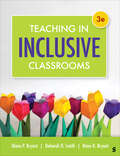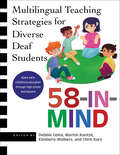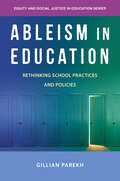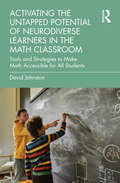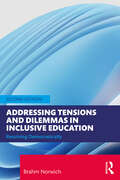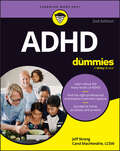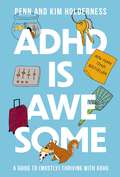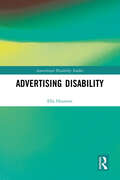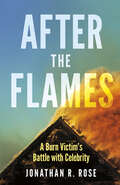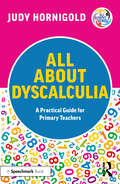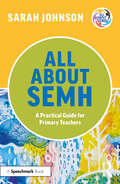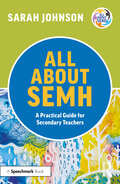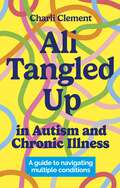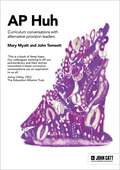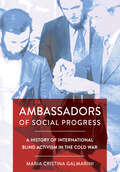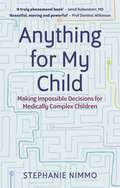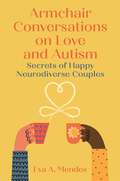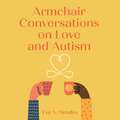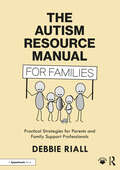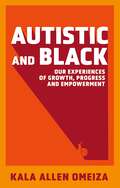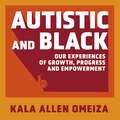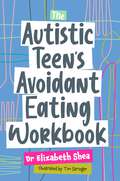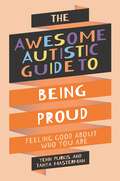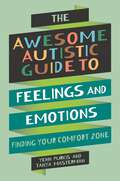- Table View
- List View
Teaching in Inclusive Classrooms
by Diane Pedrotty Bryant Brian R. Bryant Deborah D. SmithTeaching in Inclusive Classrooms uses the research-validated ADAPT framework (Ask, Determine, Analyze, Propose, Test) to help teachers determine how, when, and with whom to use proven academic and behavioral interventions to obtain the best outcomes for students with disabilities. Through clear language and practical examples, authors Diane P. Bryant, Deborah D. Smith, and Brian R. Bryant show how to create truly inclusive classrooms for students who have disabilities and who are gifted through evidence-based practices and hands-on strategies. The Third Edition includes reorganized chapters on Individualized Services and Diverse Learners, new information on the latest court cases and IDEA funds, and revised sections on disabilities. Brand new videos address a wide range of current issues in teaching, including the impacts of COVID on inclusive classrooms. With this guide, educators will be inspired and equipped to effectively teach students with disabilities in inclusive settings.
Teaching in Inclusive Classrooms
by Diane Pedrotty Bryant Brian R. Bryant Deborah D. SmithTeaching in Inclusive Classrooms uses the research-validated ADAPT framework (Ask, Determine, Analyze, Propose, Test) to help teachers determine how, when, and with whom to use proven academic and behavioral interventions to obtain the best outcomes for students with disabilities. Through clear language and practical examples, authors Diane P. Bryant, Deborah D. Smith, and Brian R. Bryant show how to create truly inclusive classrooms for students who have disabilities and who are gifted through evidence-based practices and hands-on strategies. The Third Edition includes reorganized chapters on Individualized Services and Diverse Learners, new information on the latest court cases and IDEA funds, and revised sections on disabilities. Brand new videos address a wide range of current issues in teaching, including the impacts of COVID on inclusive classrooms. With this guide, educators will be inspired and equipped to effectively teach students with disabilities in inclusive settings.
58-IN-MIND: Multilingual Teaching Strategies for Diverse Deaf Students
by Debbie Golos; Marlon Kuntze; Kimberly Wolbers; Chris KurzA highly practical and engaging resource for current and future teachers, 58-IN-MIND describes and demonstrates theoretically-driven, research-based, and classroom-tested best practices for using American Sign Language and English in instruction across the curriculum. The multilingual and multimodal instructional strategies presented here are embedded in approaches that aid learning and foster well-being. This book will support teachers in creating meaningful educational experiences for Deaf students in all grades, from early childhood education through high school. Each chapter is written by a team of researchers and P–12 teachers with at least one Deaf coauthor. With seventy-five percent of the authors being Deaf, this is the first teaching methods book to harness the expertise of Deaf professionals at this level, highlighting their vital role in Deaf education and in shaping inclusive and effective learning environments. This book meets the need for a resource that recognizes the diversity of Deaf students by creating space in the classroom to honor their home/heritage languages, cultures, races, genders, abilities, hearing levels, and other multiple and intersecting identities. Written in a conversational tone, the book includes core recommendations for instruction of the targeted subject area, examples of key strategies, lessons and real stories from those working in the field, suggestions for practice, and recommended resources. “58-IN-MIND” in the title refers to the version of the ASL sign "stick" that is made on the forehead, which is equivalent to the English idiom “to stick in one's mind.” As in, when students learn in a culturally responsive manner, the learning is likely to stick. The title also alludes indirectly to the collective aspirations of the chapter authors that the practices discussed in the book will also stick in the readers’ minds, and thus have a transformative impact on the way Deaf students are taught.
Ableism in Education: Rethinking School Practices and Policies (Equity and Social Justice in Education Series)
by Gillian ParekhHow we organize children by ability in schools is often rooted in ableism.Ability is so central to schooling—where we explicitly and continuously shape, assess, measure, and report on students’ abilities—that ability-based decisions often appear logical and natural. However, how schools respond to ability results in very real, lifelong social and economic consequences. Special education and academic streaming (or tracking) are two of the most prominent ability-based strategies public schools use to organize student learning. Both have had a long and complicated relationship with gender, race, and class.In this down-to-earth guide, Dr. Gillian Parekh unpacks the realities of how ability and disability play out within schooling, including insights from students, teachers, and administrators about the barriers faced by students on the basis of ability. From the challenges with ability testing to gifted programs to the disability rights movement, Parekh shows how ableism is inextricably linked to other forms of bias. Her book is a powerful tool for educators committed to justice-seeking practices in schools.
Activating the Untapped Potential of Neurodiverse Learners in the Math Classroom: Tools and Strategies to Make Math Accessible for All Students
by David JohnstonAll students deserve access to a rich and meaningful math curriculum. This book guides middle and high school teachers toward providing all learners – including neurodiverse students – with the support necessary to engage in rewarding math content. Students who receive special education services often experience a limited curriculum through practices that create long-term disadvantages and increase gaps in learning. The tools and strategies in this book help teachers better understand their students to move them closer to their potential. Chapters include differentiation, assessment, classroom structure, and learning targets. Both general education math teachers who have not been trained in special education support and special education teachers with a limited background in standards-based math pedagogy will learn new skills to improve their teaching from this practical resource.
Addressing Tensions and Dilemmas in Inclusive Education: Resolving Democratically
by Brahm NorwichThis updated second edition of Addressing Tensions and Dilemmas in Inclusive Education further develops the critical analysis of the initial edition that integrates the interaction between different perspectives and positions in the field of inclusive education. This key resource expands the arguments present in the first edition with clearer implications about how to address tensions and dilemmas in inclusive education, and resolve them through democratic deliberation. Based on contemporary research, theory and policy, as well as responding to current perspectives towards the education of children and young people with learning difficulties and disabilities, Brahm Norwich extends and refines the original core argument of the previous edition – the practical realisation of inclusion involves tensions and dilemmas that have to be addressed and resolved. This core analysis focuses on:- identification and classification- current national and international conceptions- pedagogic and curriculum issues- organisation of schooling- parental and student perspectives and the contribution of research to policy and practice.Re-engaging with the fundamental issues in the field and providing a coherent perspective that recognises and justifies the inter-connection between specialised and general school provision, this accessible new edition will be of interest to all students and researchers of inclusive education.
ADHD For Dummies
by Jeff Strong Carol MacHendrieDemystify ADHD with simple explanations of the basics and the latest research Attention deficit hyperactivity disorder (ADHD) is one of the most globally prevalent neurodevelopmental disorders. ADHD For Dummies explores living a healthy and fulfilling life with ADHD, from seeking diagnosis to choosing the right treatment path for you or your loved one. You’ll read about the latest in ADHD research, equipping you with valuable knowledge as you care for a child with ADHD or explore your own ADHD symptoms as an adult. This book provides the answers you need on how to deal with day-to-day challenges at home, school, and work, and how to find support and counseling. With appropriate management, anyone can live a great life with ADHD. Learn what ADHD is—and what it isn’t Get up to date with the latest information on ADHD, including medications and non-medical treatments Find the right professional to help you get the support you or your children needThis is the perfect Dummies guide for both parents of children with ADHD and adults with ADHD looking to learn more. Teachers, counselors, and therapists—this is also a great resource to educate yourself and your clients.
ADHD is Awesome: A Guide to (Mostly) Thriving with ADHD
by Kim Holderness Penn HoldernessAN INSTANT NEW YORK TIMES BESTSELLERThe engaging, uplifting antidote to traditional ADHD books (which, let's be honest, if you have ADHD you'd never read anyway).You live in a world that wasn't designed for you. A world where you're expected to sit still, stay quiet, and focus. Because of the way your brain is wired, you can feel like you&’re failing at life. But you are not failing. You are awesome.Award-winning content creators Kim and Penn Holderness are on a mission to reboot how we think about the unfortunately named "attention-deficit/hyperactivity disorder." As always, they are doing it by looking in the mirror, because they don't just study ADHD; they live it.Penn was in college when he was diagnosed with ADHD, although the signs of having a brain that worked just a little bit differently had been there since he was a kid. Rather than view the diagnosis as a curse or give in to feelings of inadequacy or failure, he took a different approach, one that he wants to share with fellow ADHDers and the people who care about them.Drawing on their often-hilarious insights and the expertise of doctors, researchers, and specialists; Kim and Penn provide fun, easy-to-digest advice and explanations, including:What it's actually like to live with an ADHD brain.How to find humor in the pitfalls, sob stories, and unbelievable triumphs (like the time they won The Amazing Race!) that come with ADHD.How to tackle the challenges ADHD presents with a positive outlook.Targeted tools and techniques to play to your unique strengths.Fun extras like ADHD Bingo, an ode to cargo pants, and what the world would look like if ADHDers were in charge.Take it from Penn: Having ADHD can be scary, but it comes with incredible upsides, including creativity, hyperfocus, and energy. You might even say it's kind of awesome. Whether you have ADHD or want to support someone else in their journey, this is the guide you need to make the life you want.
Advertising Disability (Autocritical Disability Studies)
by Ella HoustonAdvertising Disability invites Cultural Disability Studies to consider how advertising, as one of the most ubiquitous forms of popular culture, shapes attitudes towards disability. The research presented in the book provides a much-needed examination of the ways in which disability and mental health issues are depicted in different types of advertising, including charity 'sadvertisements', direct-to-consumer pharmaceutical advertisements and 'pro-diversity' brand campaigns. Textual analyses of advertisements from the eighteenth century onwards reveal how advertising reinforces barriers facing disabled people, such as stigmatising attitudes, ableist beauty 'ideals', inclusionism and the unstable crutch of charity. As well as investigating how socio-cultural meanings associated with disability are influenced by multimodal forms of communication in advertising, insights from empirical research conducted with disabled women in the United Kingdom and the United States are provided. Moving beyond traditional textual approaches to analysing cultural representations, the book emphasises how disabled people and activists develop counternarratives informed by their personal experiences of disability, challenging ableist messages promoted by advertisements. From start to finish, activist concepts developed by the Disabled People's Movement and individuals' embodied knowledge surrounding disability, impairments and mental health issues inform critiques of advertisements.Its critically informed approach to analysing portrayals of disability is relevant to advertisers, scholars and students in advertising studies and media studies who are interested in portraying diversity in marketing and promotional materials as well as scholars and students of disability studies and sociology more broadly.
After the Flames: A Burn Victim's Battle With Celebrity
by Jonathan R. Rose“A fast-paced, compelling narrative that goes far beyond the headlines.” — KEVIN DONOVAN, author of The Billionaire MurdersFor Joey Philion, surviving the fire was only the beginning.On the morning of March 10th, 1988, in Orillia, Ontario, a house fire engulfed fourteen-year-old Joey Philion in flames. He suffered third degree burns on 95 percent of his body. Doctors didn’t think he would make it through the night.After the Flames is about one of the world's most famous burn victims: his incredible survival, his nightmarish path to recovery that helped revolutionize medical treatment for burn victims worldwide, the fame thrust upon him after he was declared a hero from the media, and the tumultuous years that followed, most of which were spent under the microscope of an unforgiving public eye.The story also follows Joey’s family, including his mother Linda, stepfather Mike, and younger brother Danny, all of whom endured their own tremendous hardships in the wake of a fire that changed their lives forever.
All About Dyscalculia: A Practical Guide for Primary Teachers (All About SEND)
by Judy HornigoldAll About Dyscalculia is an accessible and informative guide for primary school teachers, designed to increase their knowledge and understanding of dyscalculia and provide practical strategies and advice to build the self-esteem and motivation of learners in their care. The book explores the indicators of dyscalculia, before detailing a range of teaching strategies that will support dyscalculic children and help them to develop their mathematical understanding and resilience. Throughout the book, there is an emphasis on creating an empathetic learning ethos in the classroom and school that will minimise maths anxiety and lead to a more positive outcome for all learners. All About Dyscalculia includes: A comprehensive introduction to dyscalculia and steps to help teachers identify children with dyscalculia in their classrooms. Practical strategies for building specific maths abilities, as well as broader problem-solving skills. Advice for teachers and parents on how to reduce maths anxiety and support the development of maths proficiency in learners. Easy to dip in and out of chapters with worked examples make this book accessible to all teachers and parents. With suggestions for immediate impact, as well as ideas for more detailed interventions, this practical book will be essential reading for all mainstream primary teachers and SENCOs, as well as a helpful guide to supporting children with dyscalculia at home.
All About SEMH: A Practical Guide for Primary Teachers (All About SEND)
by Sarah JohnsonAll About SEMH is an accessible and informative guide for primary school teachers, designed to increase their understanding of social, emotional and mental health needs, and to enhance their toolkit with practical, evidence-informed strategies to support children in their care. The book unpicks key terminology and debunks myths and misconceptions, enabling teachers to more easily understand some of the challenges for learners with SEMH needs. It then explores a range of key areas, including anxiety, attachment, bullying and self-harm, and focuses on practical strategies and adaptations that can be made in every classroom. All About SEMH includes: A comprehensive introduction to social, emotional and mental health needs, and the surrounding terms and policies. Practical strategies tailored to different conditions to help provide targeted support to primary school learners. Case studies and worked examples to illustrate points in the book, supporting behaviour recognition and developing reader understanding. Discussion on different behaviour patterns in school and at home, with the voices of parents of children with SEMH woven throughout. Easy to dip in and out of chapters with signposting to further research, resources and support. This accessible guide is a valuable resource to empower primary educators, increasing their knowledge and understanding of SEMH, and providing a range of practical strategies to support every learner in their class. It will be essential reading for all primary school educators, SENCOs and parents who are supporting children with SEMH needs.
All About SEMH: A Practical Guide for Secondary Teachers (All About SEND)
by Sarah JohnsonAll About SEMH is an accessible and informative guide for secondary school teachers, designed to increase their understanding of social, emotional and mental health needs, and to enhance their toolkit with practical, evidence-informed strategies to support learners in their care. The book unpicks key terminology and debunks myths and misconceptions, enabling teachers to more easily understand some of the challenges for learners with SEMH needs. It then explores a range of key areas including anxiety, depression, bereavement, obsessive-compulsive disorder and self-harm, and focuses on practical strategies and adaptations that can be made in every classroom. All About SEMH includes: A comprehensive introduction to social, emotional and mental health needs and the surrounding terms and policies. Practical strategies tailored to different conditions to help provide targeted support to secondary school learners. Case studies and worked examples to illustrate points in the book, supporting behaviour recognition and developing reader understanding. The difference between children’s behaviour at home and at school are examined, and the voices of parents of children with SEMH are woven throughout. Guidance on safeguarding and when to ask for additional support regarding concerns such as drug abuse or child exploitation. Easy to dip in and out of chapters with signposting to further research, resources and support. This accessible guide is a valuable resource to empower secondary educators, increasing their knowledge and understanding of SEMH, and providing a range of practical strategies to support every learner in their class. It will be essential reading for all secondary school educators, SENCOs and parents who are supporting children with SEMH needs.
All Tangled Up in Autism and Chronic Illness: A guide to navigating multiple conditions
by Charli ClementIn this ground-breaking debut, Charli Clement combines their own experiences alongside unique short profiles from individuals with chronic illness, to provide an intimate and insightful look at the complexities of living as an autistic and chronically ill person. From navigating your diagnosis and healthcare, learning how to manage pain and your own sensory needs to dealing with ableism, medical misogyny and transphobia, Clement offers practical advice and delves into the unique challenges faced by individuals living in this intersection.With a focus on the unique neurodivergent experience and an exploration into disability pride and joy 'All Tangled Up in Autism and Chronic Illness' is a necessary and empowering resource for autistic and chronically ill people as well as for family members, friends, and healthcare professionals.
Alternative Provision Huh
by Mary Myatt John TomsettFor one reason or another, mainstream education does not suit every young person. Many young people are educated in alternative provision, which is defined by the Department for Education as educational provision 'for pupils who, because of exclusion, illness or other reasons, would not otherwise receive suitable education'. As of 2023, over 25,000 young people are enrolled in alternative provision, and those numbers continue to rise.It is essential, then, that the curriculum on offer in alternative provision is exemplary, as these young people - already facing extraordinary challenges - need the very best if they are going to progress successfully into adulthood.Huh is the Egyptian god of endlessness, creativity, fertility and regeneration. He is the deity Mary Myatt and John Tomsett have adopted as their god of the curriculum. Their Huh series of books focuses on how practitioners design the curriculum for the young people in their schools.The Huh project is founded on conversations with colleagues doing great work across the education sector. In AP Huh, Mary Myatt and John Tomsett discuss curriculum provision for pupils attending alternative provision with some of the leading experts in the field. Mary and John interviewed pupils, parents, teachers, headteachers, CEOs, educational consultants and lecturers. They then edited the transcriptions of those interviews to provide an ambitious, thoughtful, nuanced and challenging vision of what the best possible provision looks like for children who find that mainstream schooling is not for them.The challenging conversations that comprise AP Huh paint a positive picture that is hugely hopeful for the future of the curriculum in our alternative provision settings.
Ambassadors of Social Progress: A History of International Blind Activism in the Cold War (NIU Series in Slavic, East European, and Eurasian Studies)
by Maria Cristina GalmariniAmbassadors of Social Progress examines the ways in which blind activists from the Soviet Union and Eastern Europe entered the postwar international disability movement and shaped its content and its course. Maria Cristina Galmarini shows that the international work of socialist blind activists was defined by the larger politics of the Cold War and, in many respects, represented a field of competition with the West in which the East could shine. Yet, her study also reveals that socialist blind politics went beyond propaganda. When socialist activists joined the international blind movement, they initiated an exchange of experiences that profoundly impacted everyone involved. Not only did the international blind movement turn global disability welfare from philanthropy to self-advocacy, but it also gave East European and Soviet activists a new set of ideas and technologies to improve their own national movements. By analyzing the intersection of disability and politics, Ambassadors of Social Progress enables a deeper, bottom-up understanding of cultural relations during the Cold War. Galmarini significantly contributes to the little-studied history of disability in socialist Europe, and ultimately shows that disability activism did not start as an import from the West in the post-1989 period, but rather had a long and meaningful tradition that was rooted in the socialist system of welfare and needed to be reinvented when this system fell apart.
Anything for My Child: Making Impossible Decisions for Medically Complex Children
by Stephanie NimmoEvery parent wants the same thing: for their child to enjoy a long and fulfilling life. But what happens when things don't go according to plan? What happens when parents have to become advocates for their child's healthcare needs? Who decides what is in a child's 'best interests'?Stephanie Nimmo faced these questions first-hand when her daughter, Daisy, was diagnosed with a life-limiting condition as a baby. Seen through the lens of Stephanie's own experiences, this sensitive book delves into the complex world of medical ethics and paediatric palliative care. From recognising tipping points to the importance of building relationships with palliative care teams well before crisis, this book explores how medical professionals can better support families throughout their child's care.Interviews with clinicians and snapshots from the lives of patients' families provide insight into the realities of life on both sides of the hospital bed. Compassionate explanations of the conflicting pressures in the hospital system foster understanding and help medical professionals and families work together.
Armchair Conversations on Love and Autism: Secrets of Happy Neurodiverse Couples
by Eva A. MendesFilled with first-hand accounts and the best kept secrets to help your relationship bloom, this book is a deep dive into loving autistic relationships and the unique strengths that drive them.Based on clinical experience and emerging research, ASC counselling expert Eva Mendes explores the complex and fulfilling relationships between neurodiverse couples. This book takes you on a journey into the relationships of 20 neurodiverse couples from all walks of life, offering insight into how they meet the challenges of daily life and the unique strengths being neurodiverse can bring to a being a partner or co-parent. The couples share down-to-earth and candid recollections of the ups and downs of their relationships, weighing in on topics from emotional connection and sex to managing co-parenting and finances.Exploring multiple intersections from race, gender and sexuality across autistic relationships, and ironing out the common myths surrounding them, Eva offers a specialist, clinical perspective on each dynamic and provides examples of best practice to have a healthy and happy relationship.
Armchair Conversations on Love and Autism: Secrets of Happy Neurodiverse Couples
by Eva A. MendesNeurodiverse couples share personal accounts of the ups and downs of being in an AS relationshipFilled with first-hand accounts and the best kept secrets to help your relationship bloom, this audiobook is a deep dive into loving autistic relationships and the unique strengths that drive them.Based on clinical experience and emerging research, ASC counselling expert Eva Mendes explores the complex and fulfilling relationships between neurodiverse couples. This audiobook takes you on a journey into the relationships of 20 neurodiverse couples from all walks of life, offering insight into how they meet the challenges of daily life and the unique strengths being neurodiverse can bring to a being a partner or co-parent. The couples share down-to-earth and candid recollections of the ups and downs of their relationships, weighing in on topics from emotional connection and sex to managing co-parenting and finances.Exploring multiple intersections from race, gender and sexuality across autistic relationships, and ironing out the common myths surrounding them, Eva offers a specialist, clinical perspective on each dynamic and provides examples of best practice to have a healthy and happy relationship.(P)2024 Jessica Kingsley Publishers
The Autism Resource Manual for Families: Practical Strategies for Parents and Family Support Professionals
by Debbie RiallThe Autism Resource Manual for Families is a treasure trove of practical, realistic and achievable strategies to support neurodivergent young people and their families with everyday life. Clearly laid out for easy use and access, it explains autism in context and provides ideas that are relevant not just for parents and carers, but for family support workers, social workers and family intervention teams. The resource covers a wide range of situations and offers an array of supports, with key topics ranging from anxiety, behaviour, and communication, to socialising, family life, and moving towards independence. With the lived experiences of parents and autistic children and young people in mind, this empowering manual includes: A wealth of situations from daily life, clearly addressed with examples of how autistic individuals may experience these and practical strategies for effective support Encouragement for parents and mini mantras for autistic children and young people to use in different situations Strategies for supporting autistic children in daily family life, including working with siblings, family holidays and eating out Advice for helping autistic young people through school, including attendance, homework and after-school exhaustion Guidance on initiating and carrying out productive conversations, as well as downloadable resources for visual conversation support. This book will be an essential tool for parents and carers of neurodivergent children and young people, as well as family or parent support workers and family intervention teams. It will also be valuable reading for pastoral teams, CAMHS, and social workers supporting these families.
Autistic and Black: Our Experiences of Growth, Progress and Empowerment
by Kala Allen Omeiza"It's time we bring forward Black autistic pain points and celebrate the triumphs of ourselves, family members, and organizations that care for these individuals. Through following the real stories of others from around the world, I hope fellow Black and autistic individuals will be empowered to realize that being Black and autistic is enough."In this powerful insight into the lives of Black autistic people, Kala Allen Omeiza brings together a community of voices from across the world, spanning religions, sexuality and social economic status to provide a deep and rich understanding of what it means to be autistic and Black.Exploring everything from self-love and appreciation, to the harsh realities of police brutality, anti-Black racism, and barriers to care, as well as amplifying the voices of the inspiring advocates who actively work towards change, protection, and acceptance for themselves and others, this book is an empowering force, reminding you that as a Black autistic person, you are enough.
Autistic and Black: Our Experiences of Growth, Progress and Empowerment
by Kala Allen Omeiza"It's time we bring forward Black autistic pain points and celebrate the triumphs of ourselves, family members, and organizations that care for these individuals. Through following the real stories of others from around the world, I hope fellow Black and autistic individuals will be empowered to realize that being Black and autistic is enough."In this powerful insight into the lives of Black autistic people, Kala Allen Omeiza brings together a community of voices from across the world, spanning religions, sexuality and social economic status to provide a deep and rich understanding of what it means to be autistic and Black.Exploring everything from self-love and appreciation, to the harsh realities of police brutality, anti-Black racism, and barriers to care, as well as amplifying the voices of the inspiring advocates who actively work towards change, protection, and acceptance for themselves and others, this book is an empowering force, reminding you that as a Black autistic person, you are enough.
The Autistic Teen's Avoidant Eating Workbook
by Elizabeth SheaWhat should I be aware of when trying new foods?Am I ready to change my eating patterns?How can I eat with other people?Food can come with all sorts of challenges - sensory issues, social pressure, loss of control - and so making choices about what foods to eat, and coping with mealtimes can be stressful - especially when other people are involved.If you are neurodivergent and looking to change your relationship with food, this interactive, accessible guide is the perfect companion. You might stick to the same 'safe' foods all the time, be attached to specific mealtime rituals, or struggle to know whether you are hungry or full. This guide will help you recognise the signs of avoidant eating, cope with food related anxieties and manage sensory overload, as well as the particular social stresses of communal eating.With top tips, a progress tracker, quizzes and worksheets, this is an engaging and informative resource for teens and parents alike.
The Awesome Autistic Guide to Being Proud: Feeling Good About Who You Are (Awesome Guides for Amazing Autistic Kids)
by Tanya Masterman Yenn PurkisWelcome to the autistic community! We're very glad you're here!Sometimes it can be difficult to feel proud of who you are. Maybe you feel different from other people or struggle to fit in - there is no need to worry! Yenn, Tanya and a tiny meerkat called Min are here to help you discover how to feel proud to be you.From learning about the autistic community, to finding like-minded friends and connecting with others, this book will give you everything you need to ask the question 'what does it mean to be me?' Learn alongside Min how the special things that make you YOU can also help find your own community.Discover your own strengths, boost your confidence, and learn how to start your journey as an awesome autistic person with the community by your side
The Awesome Autistic Guide to Feelings and Emotions: Finding Your Comfort Zone (Awesome Guides for Amazing Autistic Kids)
by Yenn Purkis Tanya MastermanUnderstanding your feelings and emotions is an incredibly important part of learning to become your most awesome autistic self!Yenn, Tanya and a tiny meerkat called Min are here to help you find out everything you need to know about your feelings and emotions, using tips and tricks they have picked up along the way to help you calm your brain down when it feels overloaded.From anger and worry to sadness and joy, emotions can come in all shapes and sizes with some feeling really big and others feeling much smaller (or even feeling like nothing), this book explores why we experience certain emotions, what they mean and how we can find the ultimate autistic comfort zone!
